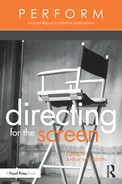INTRODUCTION
A quick scroll though IMDB will remind you that every single director you’ve ever admired, respected, and cited as your definition of success in the industry has had a career involving a mix of ups and downs, feverishly busy times, and distressingly slow times. And that’s just what you can see from the produced work. That says nothing of the projects that never made it to the screen. The “almost made its.”
The cyclical nature of sustaining a career in the film and television industry is something you can perceive as exciting or exhausting—or both. You do have to find a way to get started, beyond thinking and talking about it. You do have to find a way to stick it out. To navigate your success so you don’t muck it up. To jump off your plateau and move your career forward. And to begin again—even when it seems futile.

It can be a bit of a mystery why some people move on from high school or university and find huge success as a director—and in other cases, it may be no surprise at all. You may marvel at the careers of directors who got an early start, like Paul Thomas Anderson, or directors who got a later start, like Nora Ephron. You may find it inspiring that some directors are equally known for their writing and others are known only for directing.
You may not know that some filmmakers who are respected for their directing also do uncredited writing behind the scenes. You may not know how a director works with a writer and producer during the development of a project. You may not know what an average day looks like for a television director, or for a commercial director.
If you’re reading this book, what you do know is that you have your eyes on this career. You may already be deeply entrenched in your career, or you may only be beginning your journey now. Either way, you know that you love the doing. The creating. Next stop? The biz in showbiz.
How to Use This Book
This book is about the business of filmmaking. There are other books about craft that reinforce the tasks associated with developing your skills and talents. This book is specifically about the work involved with becoming a professional director.
You don’t have to read it cover to cover. It won’t necessarily benefit you to read the essays and interviews in order—although there’s certainly nothing wrong with that approach. But the book is structured so that you can pick and choose what to read when, at the pace that works best for you. Flip through the pages and browse the interviewee introductions and contributor bios. These will give you insight into the personalities, successes, and individual perspectives on what it takes to succeed as a filmmaker.
What is it like to intern with a Hollywood director? What is it like to be a working television director? Or a working feature director? Assistant director? Indie director? Documentary director? What is it like to be one of the most acclaimed directors in the world?
You’ll hear from a range of writers, directors, and producers in this book. You’ll read stories about starting in theater and moving into television. You’ll read about starting in local TV and moving to Hollywood features. You’ll read about starting in script supervising, assistant directing, and directing in the wild. You’ll read stories of survival, pursuing documentary filmmaking despite personal danger. You’ll read about overcoming setbacks and self-financing films as a means of recovery. You’ll learn how independent film can satisfy a deep need to share a story, and how film can support your efforts to achieve a greater good while at the same time bringing personal rewards.
You’ll get perspectives from directors in England, Ireland, Australia, Spain, Pakistan, Belgium, Denmark, and Canada. From directors in New York and Los Angeles. From directors of sitcoms, one-hour dramas, feature films, independent films, documentary films, films from the 1970s, and films from the 2000s.
The range of advice, wisdom, and stories you’ll read in this book are meant to give you perspective. The essays and interviews are grouped thematically, exploring the broad ideas of Getting Started, Sticking It Out, Finding Success, Getting Ahead, and Starting Again. These groupings, however, do not indicate that what you’ll find in each chapter is a logically ordered list of how-to advice. You won’t!
Some interviews include topical questions and responses about what it’s like to work in a specific segment of the industry (directing sitcoms or one-hour dramas or studio features), and others take a broader exploratory approach, with the interviewees sharing personal narratives or opinions about some of the more intangible aspects of their careers. The same is true of the essays. You’ll find a range of scope, from direct advice to first-person stories to analytical discussions of independent film distribution.
The key is this: Don’t look for advice alone. Look for insights. Look for new ways of approaching challenging aspects of the career. Look for information about the realities of the business. Above all else, look for a deeper understanding of how to celebrate the pursuit of success as well as the result of success.
